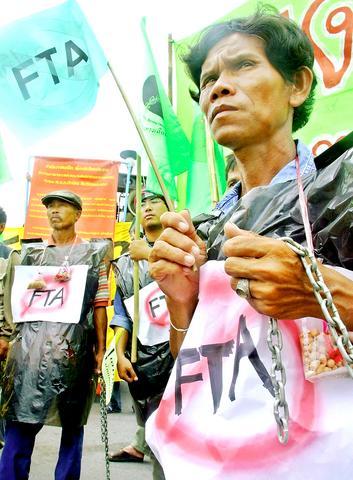Prime Minister Thaksin Shinawatra admitted corruption within government ranks but dismissed "babbling" critics who claimed graft had reached new highs, a newspaper reported yesterday.
Thaksin said he would tackle corruption within junior ranks of government if he won a second term in elections expected early next year, but dismissed claims by a former premier that the problem had reached a historic high.
Anand Panyarachun told a seminar last weekend that corruption was becoming so widespread that it could ruin the country.

PHOTO: EPA
Thaksin, who ran a huge business empire before becoming prime minister, turned on his detractors who accused his administration of being implicated in a series of conflicts of interest.
"They just kept babbling away and since the election is nearer more of them will come out of the woodwork and will lash out at me whenever a microphone is put before their mouths," Thaksin was quoted as saying in The Nation.
Thaksin said he would focus on police and corruption within the civil service if he won re-election. "Their welfare will be looked after and loopholes for corruption will be dealt with."
Thaksin has launched a war on corruption and announced a six-year goal to stamp out so-called "dark forces," a move that his opponents dismissed as a publicity stunt.
Thailand's revered monarch King Bhumibol Adulyadej earlier this year called on the public to stamp out corruption within a decade following concerns over the effect it could have on the fast-expanding economy.
Corruption has been part of Thai life for decades but critics say there has been no concerted attempt to stamp out bribery, extortion and the sale of political positions.
Nine out of ten Thais believe corruption is rampant at the national level of politics, according to a survey by the National Economic and Social Advisory Council now headed by Anand, twice briefly premier in the 1990s.
A survey of foreign businessmen by a Hong Kong-based consultancy this year found they believed corruption in Thailand was less widespread than in countries such as Indonesia, Vietnam and India but worse than South Korea, Taiwan and Hong Kong.

VAGUE: The criteria of the amnesty remain unclear, but it would cover political violence from 1999 to today, and those convicted of murder or drug trafficking would not qualify Venezuelan Acting President Delcy Rodriguez on Friday announced an amnesty bill that could lead to the release of hundreds of prisoners, including opposition leaders, journalists and human rights activists detained for political reasons. The measure had long been sought by the US-backed opposition. It is the latest concession Rodriguez has made since taking the reins of the country on Jan. 3 after the brazen seizure of then-Venezuelan president Nicolas Maduro. Rodriguez told a gathering of justices, magistrates, ministers, military brass and other government leaders that the ruling party-controlled Venezuelan National Assembly would take up the bill with urgency. Rodriguez also announced the shutdown

Civil society leaders and members of a left-wing coalition yesterday filed impeachment complaints against Philippine Vice President Sara Duterte, restarting a process sidelined by the Supreme Court last year. Both cases accuse Duterte of misusing public funds during her term as education secretary, while one revives allegations that she threatened to assassinate former ally Philippine President Ferdinand Marcos Jr. The filings come on the same day that a committee in the House of Representatives was to begin hearings into impeachment complaints against Marcos, accused of corruption tied to a spiraling scandal over bogus flood control projects. Under the constitution, an impeachment by the

China executed 11 people linked to Myanmar criminal gangs, including “key members” of telecom scam operations, state media reported yesterday, as Beijing toughens its response to the sprawling, transnational industry. Fraud compounds where scammers lure Internet users into fake romantic relationships and cryptocurrency investments have flourished across Southeast Asia, including in Myanmar. Initially largely targeting Chinese speakers, the criminal groups behind the compounds have expanded operations into multiple languages to steal from victims around the world. Those conducting the scams are sometimes willing con artists, and other times trafficked foreign nationals forced to work. In the past few years, Beijing has stepped up cooperation

Exiled Tibetans began a unique global election yesterday for a government representing a homeland many have never seen, as part of a democratic exercise voters say carries great weight. From red-robed Buddhist monks in the snowy Himalayas, to political exiles in megacities across South Asia, to refugees in Australia, Europe and North America, voting takes place in 27 countries — but not China. “Elections ... show that the struggle for Tibet’s freedom and independence continues from generation to generation,” said candidate Gyaltsen Chokye, 33, who is based in the Indian hill-town of Dharamsala, headquarters of the government-in-exile, the Central Tibetan Administration (CTA). It